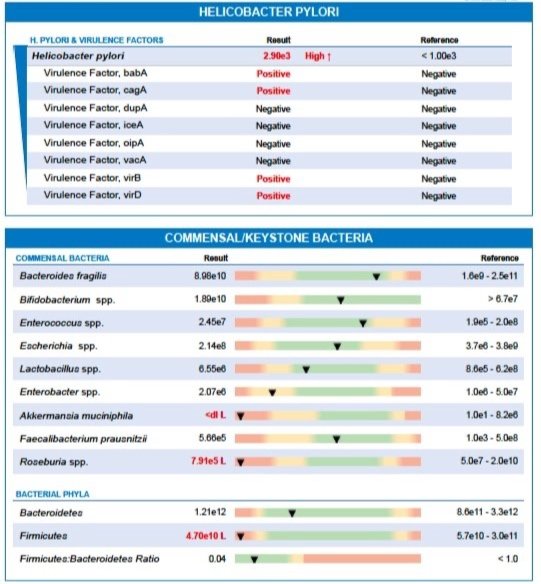The Benefits of the GI Map Stool Test (Comprehensive stool testing)
In today's evolving healthcare landscape, there's a growing shift from merely treating symptoms to uncovering the underlying root causes of chronic health issues. At the forefront of this transformation is functional medicine, which provides a deeper, more holistic approach to understanding complex health concerns—many of which conventional medicine has yet to fully address.
One of the most powerful tools in this field, that we use in our practice daily is the comprehensive stool test (GI MAP Stool Test).
Unlike standard tests that typically focus on detecting pathogens or blood, functional stool testing offers an extensive analysis of the gut's intricate ecosystem, delivering valuable insights into overall health and wellness.
What is Comprehensive Stool Testing?
The GI Map is a highly sensitive PCR-based test designed to detect imbalances such as dysbiosis, bacterial overgrowth, infections, fungus, parasites, inflammation, and other digestive insufficiencies that often contribute to unexplained symptoms. Unlike standard lab tests available through your doctor, the GI Map is far more sensitive, identifying a broader range of pathogens than typical blood or urea breath tests.
Signs You Could Benefit from a GI Map Stool Test:
Persistent constipation or diarrhea
Bloating and excessive gas
Chronic yeast infections
Autoimmune conditions
Extreme cravings
Brain fog
Acne, eczema, or psoriasis
IBS or IBD symptoms
Who Is GI Map Stool Testing For?
GI Map testing is ideal for individuals who:
Feel dismissed by their doctor despite experiencing persistent digestive or autoimmune-related symptoms, such as IBS.
Have been diagnosed with IBD conditions like Crohn's disease or ulcerative colitis.
Suffer from chronic allergies, hives, or histamine-related issues, including Mast Cell Activation Syndrome.
Struggle with skin conditions like acne, eczema, rosacea, psoriasis, or other inflammatory skin issues.
Have undergone multiple rounds of antibiotics for recurrent infections without resolution.
Experience acid reflux, heartburn, or GERD that hasn’t improved with standard treatments.
Deal with chronic thyroid issues, including Hashimoto’s or Graves' disease.
Suffer from hormonal imbalances or conditions like Endometriosis, PCOS, or other menstrual irregularities, including painful periods.
Key Markers Tested in a Comprehensive Stool Analysis
*A partial snapshot of GI Map results*
Microbial Balance
Bacteria: Measures both beneficial and pathogenic bacteria. A balanced gut microbiome is essential for digestion, nutrient absorption, and immune function.
Yeast and Fungi: Overgrowth of yeast, like Candida, can lead to systemic issues such as fatigue, brain fog, and digestive disturbances.
Parasites: Though rare, parasitic infections can cause significant gastrointestinal symptoms and systemic health issues.
Digestive Function & secretions
Elastase-1: This enzyme marker evaluates pancreatic function, which is essential for breaking down fats, proteins, and carbohydrates efficiently.
Fecal Fat: Elevated levels of fecal fat may indicate malabsorption, often due to pancreatic insufficiency or bile acid deficiencies.
Protein Breakdown Products: Incomplete digestion of proteins can lead to inflammation and contribute to conditions like leaky gut syndrome.
Inflammation Markers
Calprotectin: A key marker for inflammation in the intestines. Elevated levels may indicate conditions like inflammatory bowel disease (IBD) or other inflammatory responses.
Lactoferrin: Another marker of inflammation, often elevated in cases of bacterial infection or IBD.
Immune Function
Secretory IgA (sIgA): This antibody plays a critical role in gut immunity. Low levels may signal immune suppression, while high levels could indicate an active immune response to pathogens or food antigens.
Gut Permeability
Zonulin: This marker reflects the permeability of the gut lining. Elevated zonulin levels are associated with "leaky gut syndrome," a condition linked to autoimmune diseases, allergies, and systemic inflammation.
What Can Comprehensive Stool Testing Diagnose?
Functional medicine stool testing can reveal a wide range of conditions and imbalances that may be contributing to unexplained symptoms, including:
Gut Dysbiosis
An imbalance in the gut microbiome can lead to issues such as bloating, gas, and irregular bowel movements. Dysbiosis is also associated with broader health concerns, including autoimmune diseases and mental health disorders.Inflammatory Bowel Disease (IBD)
Elevated inflammatory markers in stool testing can help identify conditions like Crohn's disease and ulcerative colitis, offering valuable insights into the severity and nature of inflammation.Irritable Bowel Syndrome (IBS)
Although IBS is a functional disorder, stool testing can uncover contributing factors such as small intestinal bacterial overgrowth (SIBO) or food sensitivities, which may be exacerbating symptoms.Pancreatic Insufficiency
Low levels of elastase-1 in the stool indicate pancreatic insufficiency, which can result in malabsorption and nutrient deficiencies that impact overall health.Leaky Gut Syndrome
Elevated zonulin levels suggest increased gut permeability, commonly known as "leaky gut." This condition is linked to autoimmune diseases, chronic inflammation, and systemic health issues.
Why Functional Medicine Stool Testing Outshines Standard Tests
While standard stool tests are useful for diagnosing specific infections or identifying blood in the stool, they lack the depth needed to paint a full picture of gut health. Functional medicine stool testing takes it a step further, offering a more expansive and detailed analysis. Here’s why it stands out:
Holistic Approach
Functional medicine stool testing aligns with the philosophy of treating the whole person, not just addressing isolated symptoms. This comprehensive view helps practitioners evaluate the gut's role in overall health.Comprehensive Insight
These advanced tests assess a wide range of biomarkers, including the gut microbiome, digestive function, inflammation levels, and immune response. This gives practitioners a thorough understanding of what’s going on inside the gut.Preventative Health
By detecting imbalances early—before they escalate into symptomatic issues—functional stool testing plays a vital role in preventing chronic conditions and supporting long-term health.Personalized Treatment Plans
With the detailed insights provided by functional stool tests, practitioners can create highly tailored treatment plans that address the root causes of issues, leading to more effective and personalized care.
How Can I Get Started?
If you're ready to uncover the root cause of your digestive and autoimmune-related symptoms, consider taking the next step with a GI Map Stool Test. Our team of dedicated practitioners is here to guide you through the process and create a personalized treatment plan based on your unique results. To get started, apply here and begin your journey toward better health today.



